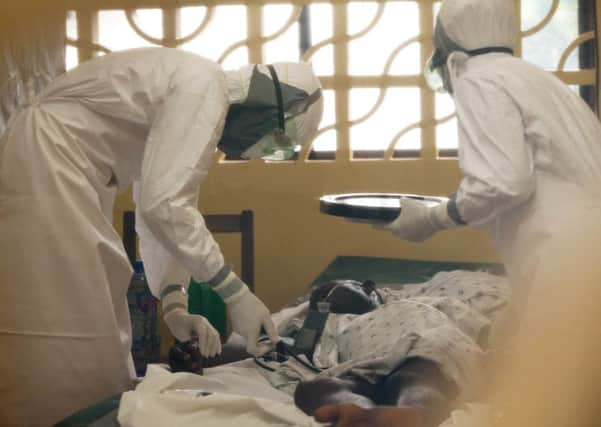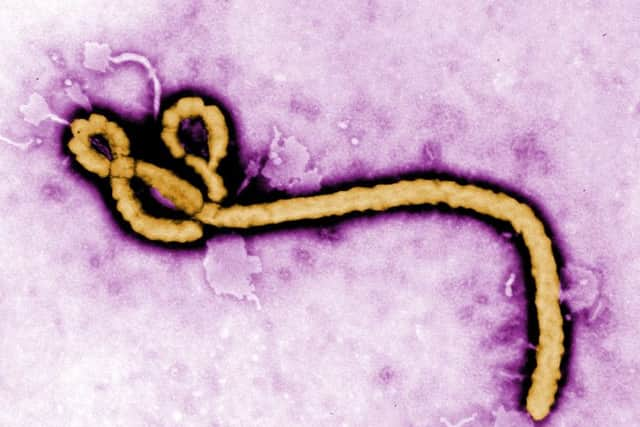Man in Birmingham tests negative for Ebola virus


Reports suggest the man was tested earlier this week after he travelled from Benin in Nigeria via Paris to the Midlands. Meanwhile, another male visited a separate UK hospital over fears he had the virus.
The man, who attended Charing Cross Hospital in west London, was assessed but doctors ruled out the need for an Ebola test, the spokeswoman added. Foreign Secretary Philip Hammond said that although there had been no cases in the UK, he would be chairing the Government’s Cobra emergencies committee later to assess the situation.
Advertisement
Hide AdAdvertisement
Hide AdHealth officials in the UK have been ordered to be on the look out for Ebola as the Government’s emergencies committee will meet to discuss the “serious threat” emerging from the largest ever outbreak of the disease.


Fears have been sparked that the epidemic that has swept West Africa, killing more than 670 people, could spread to the UK after it emerged that two people have been assessed for the virus in Britain.
“We are very much focused on it as a new and emerging threat which we need to deal with,” he told Sky News.
“As far as we are aware, there are no British nationals so far affected by this outbreak and certainly no cases in the UK.
“However the Prime Minister does regard it as a very serious threat and I will be chairing a Cobra meeting later to assess the situation and look at any measures that we need to take either in the UK, or in our diplomatic posts abroad in order to manage the threat.”
The comments come as Public Health England (PHE) warned health officials to be on the look out for any unexplained illness in people returning from the affected countries.
The outbreak has centred on Sierra Leone, Liberia and Guinea. There has also been particular concern after the densely populated country of Nigeria reported what is thought to be its first death from the disease on Friday.
American Patrick Sawyer, 40, developed symptoms on board a flight from Liberia to Nigeria. Mr Sawyer, who was of Liberian descent, had been on his way home to the US. His sister has also died of the disease. Mr Sawyer is said to have made multiple flights from Liberia to Nigeria. The disease can have a fatality rate of up to 90%, and there is no treatment or vaccine.
Advertisement
Hide AdAdvertisement
Hide AdDr Brian McCloskey, director of global health at PHE, said: “Public Health England is monitoring closely the continuing Ebola outbreak in West Africa, the largest outbreak of this disease to date.
“It’s clear the outbreak is not under control.
“PHE staff, working with the UK’s Department for International Development, continue on the ground in West Africa.
“The continuing increase in cases, especially in Sierra Leone, and the importation of a single case from Liberia to Nigeria is a cause for concern as it indicates the outbreak is not yet under control.
“The risk to UK travellers and people working in these countries of contracting Ebola is very low but we have alerted UK medical practitioners about the situation in West Africa and requested they remain vigilant for unexplained illness in those who have visited the affected area.
“People who have returned from affected areas who have a sudden onset of symptoms such as fever, headache, sore throat and general malaise within three weeks of their return should immediately seek medical assistance - but it is important to stress that no cases of imported Ebola have ever been reported in the UK and the risk of a traveller going to West Africa and contracting Ebola remains very low since Ebola is transmitted by direct contact with the blood or bodily fluids of an infected person.”
A Department of Health spokeswoman added: “Protecting the public from infectious diseases is a priority and we lead the world in this field. We are well-prepared to identify and deal with any potential cases of Ebola, though there has never been a case in this country.
“Any patients with suspected symptoms can be diagnosed within 24 hours and they would also be isolated at a dedicated unit to keep the public safe. Our specialist staff are also working with the World Health Organisation to help tackle the outbreak in Africa.”
Sir Mark Walport, the Government’s chief scientific adviser, said the disease was “potentially a major threat” to Britain because the increasingly “interconnected” nature of the world meant disruptions in far-off countries can have a major impact.
Advertisement
Hide AdAdvertisement
Hide AdHe told the Daily Telegraph: “The most dangerous infections of humans have always been those which have emerged from other species. They are a potential major threat to us. Emerging infectious disease is a global grand challenge.
“We were lucky with Sars. But we have to do the best horizon scanning. We have to think about risk and managing risk appropriately.”
Health workers tackling the outbreak in the region have been especially vulnerable to contracting the disease.
Dr Sheik Humarr Khan, who had been hailed as a national hero for his work treating patients with Ebola in Sierra Leone, died after being quarantined in hospital in the country.
Two American health workers - a doctor and a missionary - are also in hospital in neighbouring Liberia after contracting the disease, prompting two US missionary groups to evacuate non-essential personnel from the country.
SEE ALSO: